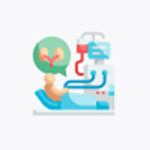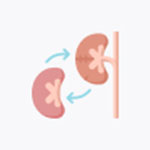Kidney Transplant in Pune
Comprehensive Care at Kidney Transplant Hospital in Pune
Our bodies are equipped with two bean-shaped organs known as kidneys, strategically positioned on either side of the vertebral column beneath the diaphragm in the upper part of the abdomen. These vital organs play a crucial role in maintaining overall health by eliminating waste products, excess water, and salt, while also regulating blood pressure, bone health, and hemoglobin levels. Kidney failure occurs when these functions are compromised, posing a threat to life. There are two types of kidney failure: acute (temporary) and chronic (permanent). Chronic kidney failure, also known as end-stage kidney failure, involves irreversible damage to the kidneys.
The advanced facilities provided by the department of Kidney Transplant treatment in Pune can be helpful to all individuals seeking kidney treatments. When kidney function reaches the end stage, requiring a permanent solution, a kidney transplant becomes a critical option. Our Kidney Transplant hospital in Pune is associated with a better quality of life, longer survival, fewer dietary restrictions, lower cost, and almost full capacity to work compared to lifelong dialysis.
Team
Looking for the Kidney Transplant in Pune
Causes of End-stage kidney failure (Permanent irreversible damage to the kidney)
Common causes include:
- Persistently uncontrolled blood sugar from diabetes can damage kidneys, making it the most common cause of end-stage kidney failure.
- Chronic glomerulonephritis, characterized by inflammation of the filter due to altered immune system, presents with proteins in the urine, high blood pressure, and increased creatinine.
- Chronic uncontrolled high blood pressure.
- Chronic recurrent kidney infections known as chronic pyelonephritis.
- Chronic obstruction to urine flow by stones, prostate, cervical cancers (in females).
- Hereditary or familial diseases like multiple cysts in the kidney, single kidney, and developmental abnormalities of the urinary bladder can also damage kidneys.
Treatment options for patients suffering from end-stage kidney disease include:

Hemodialysis
This artificial kidney performs excretory functions, removing waste products, excess salt, water, potassium, and phosphorus. Blood is pumped through a dialyzer filter (artificial kidney) by a machine and then returned to the body. This treatment can be done at a center or at home.

Peritoneal dialysis
The peritoneal membrane in the abdomen acts as a filtering membrane and fluid is pumped into the abdomen via a catheter, exchanged every 4-6 hours daily. It’s a home-based therapy that includes slow dialysis with no stress on the heart or blood pressure fluctuations.

Kidney transplant
It is the treatment of choice for end-stage kidney disease. In the process, one healthy kidney from a living donor (family) or a brain-dead donor is surgically inserted into the recipient. The transplanted kidney performs all functions required to make up for a failed kidney.
Types of kidney transplant

Living donor
The kidney is donated usually from a family member like father, mother, or siblings preferably.

Braindead donor
If a living donor is not available, one can register through a hospital with a zonal coordination center for a deceased donor transplant (Brain-dead/ cadaver transplant). A transplant will be performed when a kidney becomes available. The main problem is the long waiting list which sometimes takes 3-5 years to get a kidney depending on the frequency of donations.
While waiting for a transplant
- Remain relatively healthy and free from infection.
- Take regular and adequate dialysis.
- Avoid excessive weight gain between dialysis.
- Do not miss or ignore regular dialysis visits.
- Consume adequate proteins during dialysis.
- Control blood pressure.
- Maintain hemoglobin between 10-12 g/dl.
- Regular monthly health check-ups and blood tests.
- Engage in regular exercise, avoid smoking and alcohol consumption.
- Take all medications regularly.
- Undergo regular heart check-ups while on dialysis.

Do You Have Any Query
Please fill out the form & our representative will contact you within 24hrs.
















 View Map
View Map Book an Appointment
Book an Appointment Find a Doctor
Find a Doctor Health Check-up
Health Check-up








 Find a Doctor
Find a Doctor Health Checkup
Health Checkup Book an Appointment
Book an Appointment